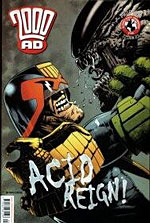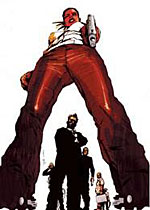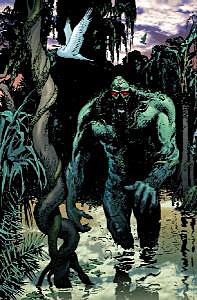>> The Friday Review: The Losers: Ante Up
>> The Friday Review: Marvels
More...

Since the last time I talked to Andy Diggle, in the course of the Dredd Generation series, the British-based writer has found himself in demand, with his new Vertigo series THE LOSERS proving a hit, and DC swiftly signing him up with an exclusive contract.
Before breaking America, however, Diggle was best known as an editor for British newsstand stalwart 2000AD. While Diggle always wanted to write, he says he ended up an editor through "a combination of experience, networking and luck".
He explains, "Over the previous decade I'd run the comics section of a bookshop, studied and then taught comics at university, and started my own website interviewing comics creators; but the one thing I hadn't yet done was find the courage to send my script samples to editors. It was only after I'd interviewed 2000AD editor David Bishop for my webzine that I decided it was time to start bombarding him with script submissions.
"I cooked up half a dozen one-paragraph ideas for 2000AD series and sent them to Alan Grant, to ask which ones he thought would be most viable. Turns out I would have been wasting my time anyway, as 2000AD were only looking for Future Shocks from new writers, and their slush pile was already two feet high - literally."
At this point, however, Diggle learned through a friend that 2000AD was advertising for a new editorial assistant. His application was successful, and instead of writing for the magazine, he found himself working there - and in at the deep end.
"Because I was already quite familiar with 2000AD and its history, I thought I knew everything - despite having zero experience in publishing. That, combined with my tendency to just come out and say exactly what I think - regardless of whether it was what people actually wanted to hear - didn't exactly enamour me to some of the senior marketing and publishing staff, especially the ones who didn't know the first thing about 2000AD or its readership. Meanwhile, David Bishop and I would often disagree and argue, but he did always take the time to answer my questions, so I was able to learn as I went along.
 Eventually Diggle took over the editorial running of the magazine from Bishop. "By far the most educational aspect of the job was just the everyday editorial process of commissioning scripts, and marrying them to the finished artwork," he says. "There's no better way to learn the nuts and bolts of comics storytelling from the inside. It's the equivalent of learning to field-strip a rifle."
Eventually Diggle took over the editorial running of the magazine from Bishop. "By far the most educational aspect of the job was just the everyday editorial process of commissioning scripts, and marrying them to the finished artwork," he says. "There's no better way to learn the nuts and bolts of comics storytelling from the inside. It's the equivalent of learning to field-strip a rifle."
As valuable as this experience was, of course, it was difficult for Diggle to exploit it as a creator while still juggling the responsibilities of the editor's chair. After writing the story 'Lenny Zero' for THE JUDGE DREDD MEGAZINE, he decided to devote himself full-time to writing, starting out with the Judge Dredd/Aliens crossover 'Incubus', a collaborative effort with legendary 2000AD writer John Wagner and artist Henry Flint.
"I was already friends with John and Henry by that point," Diggle explains, "so it was fun collaborating with them. I originally came up with the idea of doing a Dredd/Aliens crossover while I was the editor, and then John asked if I'd be interested in co-writing it with him - which was flattering, if slightly intimidating. We spent a couple of days at John's house, throwing ideas around until we had a rough outline of the plot. Then John wrote the first few episodes, I wrote the next few, and we'd alternate. I tried to mimic John's writing style, and we'd rewrite each other's scripts until the readers couldn't tell which was which. Hopefully, anyway!
"John was very patient; he helped me out when I felt like I didn't really know what the hell I was doing. I found that I really enjoyed choreographing the action scenes, but I wasn't so hot when it came to juggling multiple character scenes in a very limited space - and there are a lot of characters in the series. So that was educational too. The only thing I regret is that we spent so much time building up the characters in the first half of the story, we didn't really leave ourselves room to tie everything up at the end."
Flint also had a hand in the creative process. "Where most artists would balk at drawing complex visuals like crowd scenes, Henry encourages it," Diggle says. "There's this one scene where Dredd gets attacked by a facehugger, and Henry told us we'd missed out on the opportunity for a great visual - namely Dredd being attacked by dozens of facehuggers simultaneously. So we did it his way instead. Where some artists might try and take the easy way out, he just wades in there."
'A period drama about a bird in a big dress wasn't likely to feature exploding robots.' Diggle's passion for writing action sequences was just as apparent in his follow-up to INCUBUS for 2000AD, 'Snow/Tiger'. The story of a British counter-intelligence agent codenamed Snow, teamed with her American equivalent, codenamed Tiger, it took the classic buddy movie conceit of ideologically opposed professionals being forced to work together, and threw in American Nazis and biological weapons. Though set more-or-less in the present day, it tended to push the envelope with regards to the limits of modern technology.
"I was definitely going for an action movie vibe, although I wasn't trying to kid myself that I was writing a movie instead of a comic," Diggle says. "With regard to the present-day setting, which is unusual for 2000AD, I was conscious of something William Gibson had said to me in an interview - namely that he was interested in seeing how close to the present-day you could set a story and still give the reader that sense of 'future shock'. I thought that was interesting, hence the experimental real-world weaponry and off-the-shelf missile silos for sale."
'Snow/Tiger' had started life as a pitch to DC's Vertigo line, as an attempt to revamp DC's HAWK AND DOVE, which Diggle says was rejected for being too mainstream. "It was originally a mixture of edgy political conspiracy and extreme violence, but when I had to condense the story down from 88 pages to 46 for 2000AD, I just threw away all the conspiracy stuff and left the extreme violence! Hey, it's 2000AD."
While his HAWK AND DOVE pitch was a no-go, Vertigo editor Will Dennis came up with an alternative suggestion; a mini-series based on a minor SANDMAN character, Johanna Constantine, ancestor of HELLBLAZER's John Constantine.
"When he first suggested I write LADY CONSTANTINE, I wasn't wildly enthused - partly daunted by the prospect of following in Neil Gaiman's footsteps, and partly the knowledge that a period drama about some bird in a big dress wasn't likely to feature legions of exploding robots. But once I discovered that Will was keen for me to do something a bit more action-oriented, it became a lot of fun. And it actually ended up being a lot more respectful to the source material than I had expected; it's chock full of hidden references to SANDMAN, HELLBLAZER and SWAMP THING continuity. I guess I'm just a big fanboy at heart!"
 Diggle has quickly established himself as one of Vertigo's favourite new talents with his hit series THE LOSERS and his forthcoming SWAMP THING relaunch. This, despite once telling Tripwire magazine "Our writers [at 2000AD] don't get mired in all this corporate bullshit and endless bureaucracy... and they can write much weirder, darker, funnier, edgier material than they could get away with for the US market".
Diggle has quickly established himself as one of Vertigo's favourite new talents with his hit series THE LOSERS and his forthcoming SWAMP THING relaunch. This, despite once telling Tripwire magazine "Our writers [at 2000AD] don't get mired in all this corporate bullshit and endless bureaucracy... and they can write much weirder, darker, funnier, edgier material than they could get away with for the US market".
"Bear in mind that when I said that, it was my job to be the cheerleader for 2000AD, and I was talking more about mainstream American comics than more left-field stuff like Vertigo. But on the whole I think it's still true," Diggle points out.
The Vertigo audience certainly seems ready for Diggle's brand of dark, funny, edgy material, as shown by the enthusiastic reception for THE LOSERS, an action-packed tale of a former Special Forces Unit waging war on the CIA, illustrated by Jock, another transatlantic import from the pages of 2000AD export.
"I was pleasantly surprised, I must say! I tend to be a bit down on my own work and always assume the worst, so it's always a nice surprise when people say they've enjoyed it. DC have really backed us to the hilt, and they'd always planned an early trade to help boost sales of the monthly. Still, February 2004 is a lot earlier than I was expecting, and I guess that's largely due to the positive response.
"THE LOSERS isn't for everybody, but I've deliberately tried to write something for the regular guy in the street, rather than the endlessly self-referencing 'comics about comics', which tend only to appeal to the superhero fanboy crowd. And it seems to have worked. I'll be interested to see how the readers respond when everything stops exploding around issue seven, and the characters start getting a bit more room to breathe. It'll be nice to slow things down and relax into the larger story after the breakneck pace of the first arc."
Diggle is a major advocate of genre diversification. "I've got nothing against superheroes, I enjoy BATMAN and THE ULTIMATES as much as the next guy, but for the most part I don't pay a huge amount of attention to the spandex stuff.
"I'd like to see more comics aimed at people like me. People who are aware of comics but don't obsess over them, people who go to the movies and watch TV and want to be entertained without having to memorise 50 years of continuity. In other words, 'the general public'. There's too much of a gulf in comics between cheesy pulp on the one hand and worthy-but-dull, highbrow 'indie' stuff on the other. I'm all for reaching a wider audience, and that means giving people stuff that's smart, accessible, entertaining and immediate. I think the crossover success of stuff like SANDMAN, PREACHER, TRANSMET, 100 BULLETS, Y and FABLES shows there's a market for it."
 Alongside well as the action-packed conspiracy drama of THE LOSERS, Diggle also has a horror book in the works for Vertigo, the aforementioned SWAMP THING: BAD SEED. Originally conceived as a mini-series, Vertigo now plans to spin it out into a new ongoing, though Diggle won't be at the helm.
"I guess I must have been doing something right, because once the scripts started coming in, DC asked me to turn it into an ongoing series," Diggle says. "The exact same thing had happened with THE LOSERS. It was gratifying, as the whole point of the series was to get Swamp Thing back to a place from which they could spin off into an ongoing series if they wanted to.
Alongside well as the action-packed conspiracy drama of THE LOSERS, Diggle also has a horror book in the works for Vertigo, the aforementioned SWAMP THING: BAD SEED. Originally conceived as a mini-series, Vertigo now plans to spin it out into a new ongoing, though Diggle won't be at the helm.
"I guess I must have been doing something right, because once the scripts started coming in, DC asked me to turn it into an ongoing series," Diggle says. "The exact same thing had happened with THE LOSERS. It was gratifying, as the whole point of the series was to get Swamp Thing back to a place from which they could spin off into an ongoing series if they wanted to.
"I always enjoy problem-solving and fixing stuff, but then I'm done. I feel like I'll have said pretty much everything I have to say about Swamp Thing by the end of BAD SEED. Plus, writing two ongoing company-owned books every month wouldn't really leave me with any time to do anything else, so I've politely declined. But that's cool, DC have been talking to Will Pfeiffer about picking up the story where I left off, so that way everybody's happy. I'm looking forward to seeing Will pick up the ball and run with it!"
As a character, Swamp Thing remains best associated with Alan Moore, whose work on the title is credited with inventing the Vertigo line. Is it a daunting prospect, to be working in Moore's shadow?
"Yeah, it's daunting! I mean, you're not just talking about Alan Moore but also Mark Millar, Grant Morrison, Brian K Vaughn and all the others - including, let's not forget, Len Wein. So it's a tricky balancing act. Each of those writers had a very strong vision of what they wanted to do with the character, and each took it off in their own unique direction.
"Unfortunately, this has led to some horribly convoluted continuity, which makes it almost impossible for a new reader to jump on board. For example, when we last saw the Swamp Thing, he had mastered the elements of Earth, Air, Fire and Water, and literally became the planet Earth itself. Meanwhile, his wayward teenage daughter was the new 'earth elemental', with both plant- and flesh-based powers. Now that's a pretty confusing place for a new reader to start.
"So I figured either I could either take SWAMP THING off in yet another completely new and unexpected direction, re-inventing the series from the ground up ... or I could try and tie up all the loose ends, bring the character back to his roots, and make him accessible again. I've chosen to try the latter. Of course, the real challenge lies in resolving all these plot threads in a way which is both interesting and accessible to readers who may never have picked up an issue of SWAMP THING in their life. And I've made it even harder on myself by doing the whole thing without captions, when SWAMP THING has always been synonymous with these lyrical narrative captions and internal monologues.
"Like I say, it's a challenge."

All rights reserved. This article may not be reproduced without the author's express written permission.


